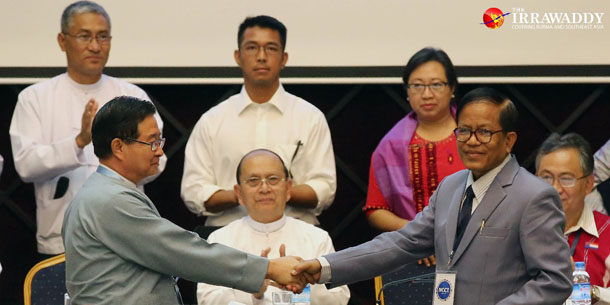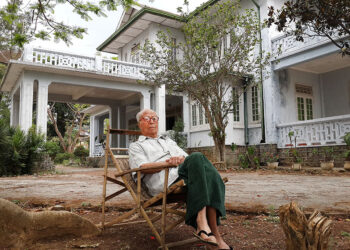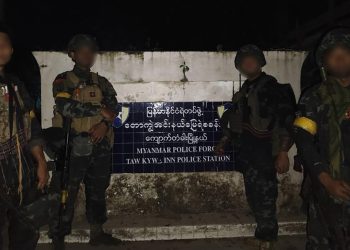RANGOON & CHIANG MAI, Thailand — Not an ounce of expression as Ja Nan retells the story of how her father first became involved in Kachin State ceasefire negotiations a quarter century ago. He was living abroad in 1989, she said, when Maran Brang Seng, then-chairman of the Kachin Independence Organization (KIO), called him to ask for help. She remembers her father’s account of that phone call, the chairman pleading, “You are over in Canada having a good life, but here we are dying.”
Ja Nan is the director of the Nyein Foundation, a peace facilitation group based in the Kachin State capital of Myitkyina. She is among a small cadre of professionals to work as technical advisors for Burma’s peace process, and as such has been the recipient of a number of international honors including a prestigious N-Peace Award, which she was given just last month.
The Nyein Foundation was established by Ja Nan’s father, Saboi Jum, a reverend and former director general of the Kachin Baptist Convention (KBC), who along with his brother had been a key broker of the 1994 ceasefire between the Burmese government and ethnic rebels in the country’s far north. That peace deal, the only one in Burma to have culminated in a written agreement at the time, proved to have unpleasant outcomes.
Brang Seng didn’t live to see the damage done, suffering what turned out to be a fatal stroke just months before the deal was made. The accord held for 17 years, a period now viewed as one of increased occupation by the Burma Army, economic exploitation and rapid depletion of the state’s rich resource reserves. While it was a time of relative peace for the ethnic Kachin minority, it came at a very high cost. Political talks promised in the pact took years to commence and were ultimately denounced as a sham. Saboi Jum, who was also debilitated by a stroke just a few years ago, earned notoriety among Kachin people for ushering in an era of cronyism and subjugation to the regime’s capital interests, which included a wealth of jade, timber and energy extracted from the once virgin territory.
In 2011, just months after President Thein Sein took office and the wheels of reform began to turn, that period came to an abrupt end. The Burma Army broke the pact when it attacked several positions of the Kachin Independence Army (KIA), the KIO’s militant wing, near the site of the Ta-Pein hydropower project in Momauk Township, in the southern part of the state near the China border. War soon spread to other parts of Kachin and northern Shan states, and continues to date. The renewed conflict has been among the most ruthless in Burma’s prolific history of civil war, characterized by aerial bombardment, attacks on civilians and allegations of systemic sexual violence in conflict.
Four years on, after the displacement of more than 100,000 civilians, countless deaths and broken promises, the KIA is one of 16 ethnic armed groups involved in negotiations with the government geared toward a nationwide ceasefire agreement. Following a cascade of deadlines set by the government and then forgotten as they passed uneventfully by, several stakeholders in the process say they now believe they are approaching a deal that would lead to a political dialogue, the ultimate aim being the establishment of a federal union granting autonomy to ethnic states. Thein Sein has recommended penning the pact before a general election in November, which would cement his presidential legacy as a unifier before his premier term ends early next year.
A Man’s War
Ja Nan is one of only a handful of women privy to the inner workings of the peace process, though she’s not what you would call a decision maker. The Nyein Foundation, which is unofficially called “Shalom” but the government does not accept the name, provides technical support for the process; she trains women for future participation, observes many of the precursory conferences and liaises between the government’s negotiation body—the Union Peacemaking Working Committee (UPWC)—and the ethnic bloc—the Nationwide Ceasefire Coordination Team (NCCT), represented in negotiations by an elite lineup called the Senior Delegation.
Those two teams, in various permutations, have spent nearly two years trying to broker a deal that would end the decades-long civil war between the Burmese government and more than a dozen ethnic armed groups, all of which are overwhelmingly steered by men. While the effects of war are often felt acutely by women—who lose both loved ones and livelihoods, are threatened by or subjected to sexual violence, and feel the fallout of shattered economies in the form of mass migration—they are largely excluded from conflict resolution because they were never empowered in the ranks of the warring forces. Given her personal history, Ja Nan is in an unusual and highly privileged position.
“This is something of a family tradition,” she told The Irrawaddy in her Rangoon office earlier this year. Born in Myitkyina in 1965 and schooled abroad, Ja Nan wasn’t naturally drawn to peace studies. She lived through war, and she knew many families that were affected by conflict. An active member of the Baptist church, she chose to focus on religion and education until the Nyein Foundation’s board members encouraged her to follow in her father’s footsteps. After completing a Master’s degree in peace and conflict resolution at the Eastern Mennonite University in the United States, Ja Nan joined the Nyein Foundation in 2003, a few years after it was founded. When her father resigned last year, the mother of three was appointed as the director and has since become an integral member of the peace process, one of the few female faces seen in photographs of the negotiations.
Under-representation of women is not lost on anyone who has observed Burma’s peace process. Ja Nan doesn’t actually sit at the drafting table, but she’s often in the room when high-level decisions are made—and that’s about as close as a woman can get at this juncture. Only three women are among the negotiators: Zipporah Sein, vice-chair of the Karen National Union (KNU) and the daughter of its former leader; Saw Mra Razar Lin of the Arakan Liberation Party; and Mi Yin Chan, a government-appointed member of the UPWC. Ja Nan said, however, that there’s more to the picture than meets the eye. While few women even come close to the negotiating table—exactly 12, by her count—a network of highly trained women occupy “supportive roles” and are likely to come out of the woodwork once a deal is struck and political dialogue begins, which will happen within 90 days of signing an accord.
Because of “structural challenges” within every tier of power, Ja Nan said, women cannot reach positions from which they can argue for their inclusion in high-level decision making. Low representation in the government, the Burma Army and the leadership of ethnic armed groups—all of which she suggested could be ameliorated with the help of gender quotas—leave women ill-equipped and lacking in confidence.
“In the current phase,” Ja Nan said, “I don’t think they can be doing any more to include women. The discussions happening now are about the ceasefire, and the men at the table are the ones in the highest positions of their respective militaries. During the political dialogue, that’s when we will see much more room opening up for women’s participation.”
This will happen, in part, through the work of the Alliance for Gender Inclusion in the Peace Process (AGIPP), an eight-member network co-founded and currently chaired by the Nyein Foundation. Its other members include the Gender Equality Network, Gender and Development Institute, Kachin Women Peace Network, Mon Women’s Network, Shan State Women’s Peace Network, Women’s League of Burma and the Women’s Organizations Network. These organizations, which are among Burma’s most distinguished women’s rights groups and are led by award-winning figures such as May Sabe Phyu and Tin Tin Nyo, are already working tirelessly—albeit invisibly—to prepare for the eventuality of a space for women’s input. For better or worse, they are ready for the war to end.
This article was updated on Oct. 7, 2015 to reflect the fact that more members had joined the AGIPP since our original reporting took place.

















